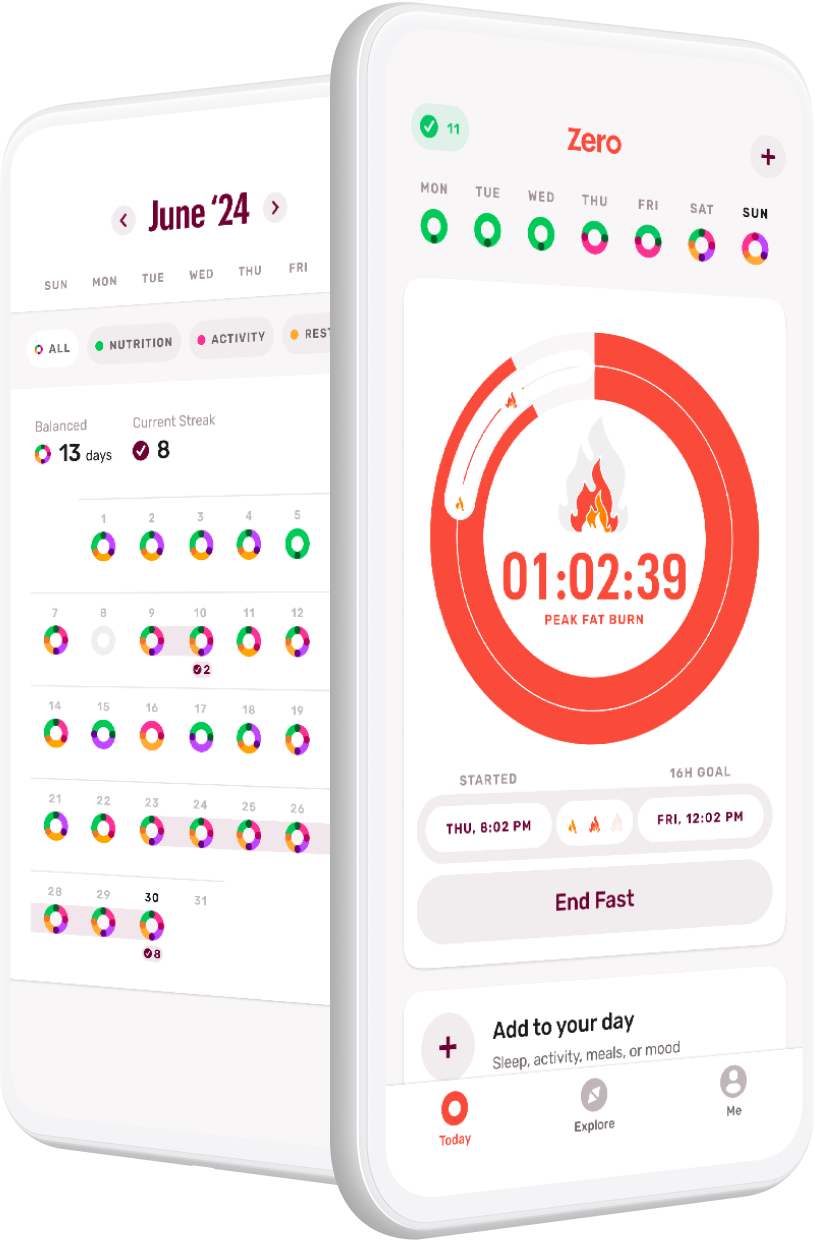Written and medically reviewed by Rich LaFountain, PhD
Medically reviewed by Dr. Naomi Parrella, MD
If you’re interested in fasting, then you’ve probably heard about the many health and longevity benefits of autophagy. Autophagy is a natural housekeeping process that cleans up your cellular environment, manages energy levels, and improves longevity. The good news is that your cells are perfectly set up to access the protective, anti-aging benefits of autophagy through fasting.
What Is Autophagy?
The word autophagy was derived from Greek, and it literally means self-eating. The concept of autophagy emerged during the mid-twentieth century, when researchers first observed that cells could destroy and recycle their own parts.
Autophagy is a natural, vital process that occurs in your body, and it is one of the best ways to detox and clean out poorly functioning, older, or unneeded parts of your cells. Research in rodents shows that when autophagy genes are removed so that normal autophagy processes are inhibited, the mice are unable to survive due to organ and tissue degradation. Autophagy enables your body to fix, recycle, and replace cellular components. Autophagy is a key process that slows and prevents the normal decline in cellular health and function that comes with aging.
How to Induce Autophagy
Autophagy can be induced (i.e., turned on) in a number of ways. Energy stress is vital to turning on autophagy. Exercise, a positive stress, is a great way to turn on autophagy, but the autophagy processes are primarily concentrated in active tissue (i.e., muscles worked). For example, cycling may only turn on autophagy in your lower body.
You can turn on autophagy with virtually any type of physical exertion, but research suggests high-intensity interval training (HIIT) may be one of the most effective strategies for autophagy through exercise.
But what if you want to turn on autophagy throughout your entire body, including within important metabolic organs like your liver or even your brain? Calorie restriction and fasting both stimulate an autophagy response more universally throughout your body.
What Is Autophagy Fasting?
Autophagy fasting is a dietary strategy that involves fasting for a specific period of time to stimulate autophagy. During a fast, once your body has burned through much of its stored carbohydrate energy resulting in low liver glycogen levels, you enter a state of ketosis, where fats are broken down for energy.
This process results in the production of ketones, which triggers many changes in the body— including activation of autophagy. When glucose levels remain relatively low and ketones are on the rise, the body begins to recycle damaged or unnecessary cellular components to provide energy and building blocks for new cell parts.
Autophagy fasting unlocks a superpower within your healthy cells that improves their energy efficiency dramatically in a time of low energy input. It’s almost as if your cells have a “garage sale,” exchanging unwanted items and clutter for money, but instead of money they actually receive energy, the most valuable currency for your body.
What Happens When You Fast for Autophagy?
Much of our understanding of fasting-induced autophagy has been translated from animal studies. Autophagy is not an on/off switch — instead, it is much more similar to a dimmer that gradually illuminates as your fast duration increases past 16 hours of fasting. According to clinical research, your fasting autophagy dimmer switch is not at peak “brightness” until at least 36–72 hours into a fast. For those who want to try to maximize the deep benefits of autophagy, the majority of studies present evidence that suggests you may need to target longer fasts lasting 2 to 4 days. It’s important to remember these longer fasts can cause rapid changes that may require professional support in managing fluids and electrolytes as well as even reducing or adjusting medications.
Since multi-day fasting is understandably not for everyone, it’s promising to note that recent studies have demonstrated that shorter duration fasts can also initiate the autophagy process. One randomized crossover trial demonstrated that fasting 18 out of 24 hours for less than 1 week with some caloric restriction could increase autophagy markers in the body. Similarly, recent research indicates that one month of fasting 17–19 hours each day increases autophagy signals in humans. Autophagy is an intricate natural process within your cells and is not easily measured, like with blood glucose. However, thanks to continued work in this area, we’re learning that shorter-duration fasts — especially when coupled with other autophagy-promoters like exercise — may present an alternative strategy for individuals who are not up to a multi-day fast.
Autophagy Fasting Benefits
Autophagy fasting is an active area of research in humans, but it is believed to have a number of potential health benefits, including:
- Improved cellular health and function
- Enhanced metabolic flexibility and stabilized energy levels during stress
- Healthy weight loss and better insulin sensitivity
- Reduced inflammation and oxidative stress
- Protection against heart disease
- Greater brain health and reduced risk for neurodegenerative diseases
- Potential adjuvant to cancer treatment
- Improved immune-system function and overall longevity
How to Fast for Autophagy
The length of time needed to trigger autophagy through fasting can vary depending on a number of factors, including your individual metabolism and dietary habits. Generally, it is recommended to fast for at least 16 hours to stimulate autophagy, but this varies by individual. Autophagy fasting can be something you invest in through small, consistent fasts lasting 17 or more hours, or you can opt to do longer fasts less frequently; perhaps a few times each year, you do a 48–72 hour fast to maximize your fasting autophagy. Maybe you like the idea of blending the two — if so, just make sure that you are practicing responsible fasting. Longer fasts aren’t for everyone, and most people will find success (and still enter Fat-Burning Mode!) with 12–18 hour fasts, which can be easily and safely made into a part of your regular routine.
Can You Induce Autophagy with Intermittent Fasting?
While the specific length of time needed to induce autophagy may vary from person to person, intermittent fasting is an effective way to stimulate autophagy. Based upon the research, you may want to work up to a fast of at least 17 hours, and you may opt to fast longer so that you can slide that autophagy dimmer switch further into the “on” position. However, it’s important to note that if you take blood-pressure medication or medication that lowers blood sugar, you should consult with your healthcare provider before trying longer fasts.
There are a number of checkpoints that happen in the body that initiate autophagy, and they are related to energy-sensing pathways such as AMP-activated protein kinase. As energy levels are reduced, cell growth and protein synthesis, which are regulated by mTOR, are systematically paused as autophagy processes come online.
Autophagy initiation is often closely related to the metabolic switching that happens as your body shifts from glucose and glycogen burning to primarily fat burning and ketone production. As such, some people find that targeting a Glucose Ketone Index (GKI) of 1.0 can serve as a relatively accessible indicator of autophagy in the body. Reaching a GKI of about 1.0 is likely to take more than 24 hours.
What Can You Drink While Fasting for Autophagy?
When you’re fasting for autophagy, it is important to stay hydrated, but your goal is a pure fast with zero calorie intake. In order to turn on autophagy, avoid stimulants like caffeine, certainly sugar-sweetened, as well as non-nutritive, non-caloric sweeteners. Autophagy fasting requires that you are a bit more strict than your average fast for metabolic health or weight loss. Coffee may block the autophagy benefits of fasting; therefore, when fasting to induce autophagy, it is best to stick with water, water and electrolytes, carbonated (unflavored) water, and caffeine-free herbal teas only.
What to Eat After an Autophagy Fast
After completing an autophagy fast, especially one that is greater than 24 hours, it is important to ease back into eating and support your nutrition needs. Start with small, high-protein meals that are easy to digest, such as bone broth, cooked vegetables or scrambled eggs. Avoid processed and high-sugar foods, as they can cause blood sugar spikes and interfere with the body’s natural processes. Focus on whole foods, which are rich in vitamins, minerals, and antioxidants to help support cellular health and function.
Some examples of foods to eat after an autophagy fast include:
- Bone broth, which is easy to digest and rich in protein (from collagen) and other nutrients. Like bone broth, miso soup is a great plant-based option to break your autophagy fast.
- Lean proteins, such as chicken, fish, and tofu, are rich in amino acids that play several important roles in rebuilding proteins and cellular repair after autophagy.
- Healthy fats, such as eggs, avocado, nuts, and seeds. Healthy fats help to rejuvenate your cell membranes.
- Fermented foods, such as kimchi and sauerkraut, are rich in probiotics that can help to support gut health and immunity. Autophagy can shift your gut microbiome, so it’s always a great idea to rebalance your microbiome species with a probiotic, especially if your autophagy fast is greater than 24 hours.
Conclusion: A Measured, Targeted Approach to Autophagy Fasting Can Fight Aging and Improve Health
Fasting for autophagy is a great way to improve your overall cellular and metabolic health, both of which have a significant role in healthy aging. The process takes some time, but the research shows it’s a worthwhile investment that contributes to improved healthspan and lifespan.
Ready to start using Zero? Take the quiz or download the app today.
- Debunking 3 Myths Around Fasting and Thyroid Health - April 15, 2024
- Breaking Down Fast Breakers: How to Tell If Something Will Break Your Fast - March 4, 2024
- GLP-1s and Weight-Loss Medications vs. Lifestyle Interventions: What’s Right for You - February 5, 2024


This all makes complete sense except for one thing, if you consult your Dr before you start fasting he/she is most likely to try and convince you that it is unhealthy. Most Dr’s are of the opinion that we should eat 3 square meals a day plus snacks. So by all means consult your Dr and then ignore his advice and fast anyway. This is what I did and several years later went back to see him just to prove him wrong.
So I do 20-4 at least 5 days a week and follow keto diet when i eat am i hitting autophagy daily?
That is a really great question that I would like to know the answer to also!